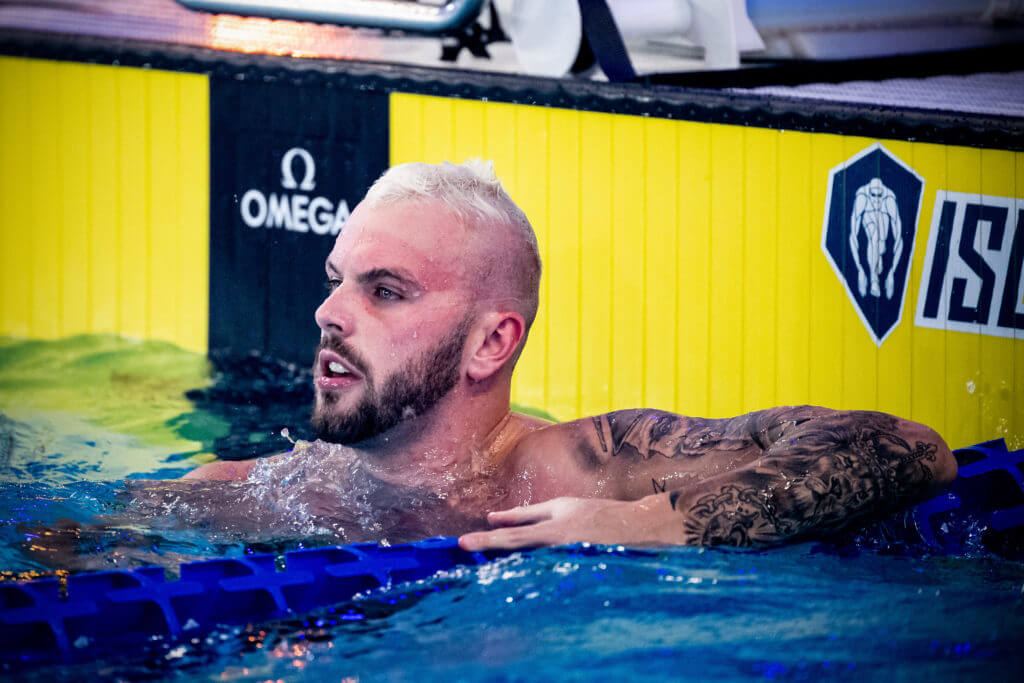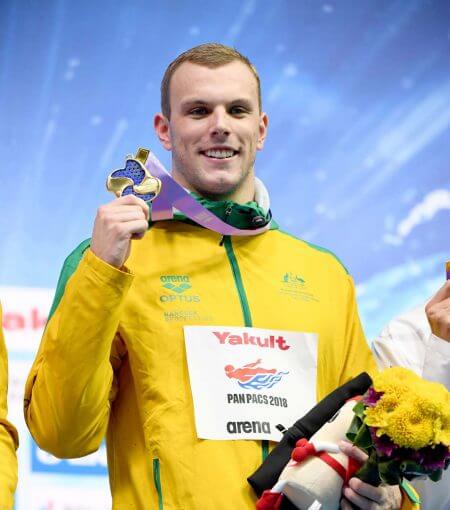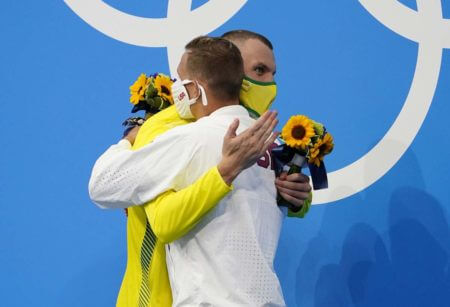Kyle Chalmers Still Superb, Still Searching for Big Win Over Caeleb Dressel

Kyle Chalmers Still Superb, Still Searching for Big Win Over Caeleb Dressel
When Kyle Chalmers became an Olympic champion, he was just a month past his 18th birthday, the youngest man in a loaded heat of 100 freestylers. He had never swum an individual event at a major international meet, although he did make his debut on relays at the 2015 World Championships. The young Australian flipped seventh at the halfway point, his 23.14 a full nine tenths off the lead. But Chalmers closed the gap and then finished with a flourish, coming home in 24.44 that out-split the rest of the field by four tenths. His final time of 47.58 was a world junior record, a mark he had previously broken in both prelims and semifinals.
That night in Rio de Janeiro, Chalmers became the youngest man to win an individual gold medal in swimming since Ian Thorpe did so in 2000. The only other teenage individual gold medalists during that time were Michael Phelps and Park Tae-Hwan. And if that was not going to be enough, Chalmers’ future looked incredibly bright.
Just under a year later, Chalmers was in Budapest for the World Championships, present in the Duna Arena on the night of the men’s 100 freestyle final. But he would not be aiming to back up Olympic gold with a world title. Instead, he was sitting out after surgery to address a heart condition called supraventricular tachycardia, in which electrical pulses in his heart were routed through an extra circuit.
Chalmers was recovering, but he needed more time before returning to racing. In his absence, he predicted that Caeleb Dressel, two years older but never a winner of an individual medal at an international meet, would capture the world title in the blue-ribband event.
Indeed, Dressel would dominate, crushing the field by seven tenths and laying down a new American record. His 47.17 surpassed Chalmers’ personal best from the Rio Games by four tenths. After his Olympic conquest, Chalmers now had a new standard to chase.

Kyle Chalmers scored his last win over Caeleb Dressel in the 100 free at the 2018 Pan Pacific Championships — Photo Courtesy: Delly Carr/Swimming Australia
Four years later, we have witnessed incredible showdowns between these two sprint titans, with each one delivering their best performances in big moments. At the 2018 Pan Pacific Championships, neither was at their best or under 48 seconds, and Chalmers won gold while Dressel tied for silver. But at the 2019 World Championships, Dressel opened up a big lead, only for that lead to evaporate over the final 10 meters as Chalmers closed in. Dressel won gold in 46.96, becoming only the third man to break 47 and the first ever in a textile suit, while Chalmers was 0.12 back in 47.08.
Dressel congratulated his Australian rival in the next lane and then celebrated by sitting on the lane line. But of course, this meeting settled little. True bragging rights would be earned at the Tokyo Olympics one year later — which turned into two years later, thanks to the COVID-19 pandemic.
Before that, another health issue nearly derailed Chalmers in late 2020, and he underwent arthroscopic shoulder surgery. But he fought to be ready for Tokyo, and he indeed qualified for the Games with wins in the 200 free and 100 free at Australia’s Olympic Trials. By the time the 100 free final rolled around, Chalmers already had won two bronze medals in Tokyo on freestyle relays, including a 400 free relay where his 46.44 anchor split willed Australia past Canada for third.
In the 100 free final, Dressel and Chalmers would be two lanes apart this time, but the race unfolded as usual: Dressel got out to his signature blazing start and opened up a lead at the turn, but Chalmers was just three tenths back, and he started making up ground quickly. With 15 meters to go, Chalmers had pulled even. But somehow, Dressel maintained his razor-thin advantage. He got to the wall in 47.02, this time just six hundredths ahead of Chalmers, who again swam a 47.08. It was one of the signature moments of the Olympics.
With 15 meters to go, Dressel had stopped breathing and accelerated his tempo, while Chalmers stayed consistent and continued to breathe all the way into the last five meters. Maybe that affected the outcome, maybe not. Regardless, Dressel got the job done and took over the title as gold medalist.
But Chalmers was gracious in defeat, even in an interview with Australia’s Channel 7 moments after the finish.
“It’s half a second faster than I was in Rio. You know, if it went ahead last year, I wouldn’t have been here swimming,” he said, referring to his shoulder injury. “I left everything in the pool, I gave all I could. Obviously, life’s not always about winning but it is nice, and I executed the race well, and I felt strong and felt good.”
Chalmers added, “But you know, to win gold in 2016, come back and win silver, it is great. I did everything in my absolute power to win.”
Rightly or not, Chalmers will be linked to Dressel for as long as those two are still competing. Dressel has been the consensus top swimmer in the world since the 2016 Olympics, and in Tokyo, he became just the third man (after Mark Spitz in 1972 and then Phelps in 2004 and 2008) to win three or more individual gold medals at an Olympics. Chalmers was the only man to come close to knocking off the American.
Less than two months after their Olympic-gold-medal grudge match in Tokyo, the two nearly raced again in a much lower-stakes environment. During the five-week International Swimming League (ISL) regular season in Naples, Italy, Chalmers and Dressel overlapped for a single match, the sixth, but Chalmers only swam relays at that meet and Dressel did not compete on the second day, which included the 100 free.
So their next matchup will wait a bit longer. But consider this: in the short course meters season which includes the ISL, Dressel’s top 100 free this year is 45.47 from the fourth ISL match. Chalmers swam a 45.65 in the ISL and then a 45.50 at the FINA World Cup in Budapest. Neither of those races involved any significant challengers.

Kyle Chalmers (in yellow) hugs Caeleb Dressel on the Olympic podium after the men’s 100 free final in Tokyo — Photo Courtesy: Rob Schumacher/USA TODAY Sports
Both men are chasing the SCM world record in the event, Amaury Leveaux’s 44.94 set during the polyurethane suit era in late 2008. Dressel came as close as anyone ever had during the 2020 ISL final at 45.08 while Chalmers skipped the entire 2020 ISL season, around the same time he was recovering from surgery. Can these two push each other to topple that 13-year-old record?
In the upcoming ISL playoffs in Eindhoven, Dressel’s Cali Condors and Chalmers’ London Roar are scheduled to meet once, in the fourth match November 20-21. We will probably — hopefully — see the next installment of Dressel vs. Chalmers then.
They will have a chance at the world record in November but a much better chance at the ISL final in early January, with both the Roar and the Condors seen as heavy favorites to qualify for that meet (along with Energy Standard). Maybe both men suit up for the Short Course World Championships in Abu Dhabi in late December, but rosters for that meet have not been released.
Whenever they do race, Dressel vs. Chalmers is must-see TV: the best swimmer in the world against perhaps the only man capable of beating him in one of his main events. That challenger has overcome heart issues and shoulder issues to return to and surpass his best in the years following his breakthrough as a teenager.
Although the two biggest matchups of their careers have gone in Dressel’s favor, this rivalry could have a long way to go. Chalmers has been one of the world’s best since 2016, but he is still only 23, and Dressel is just 25. And after so many close finishes, it is a matter of time before Chalmers steals a big win.




Two biggest match ups have gone in Dressel’s favour? Chalmers searching for a win over Dressel? So 2016 and 2018 apparently don’t count. Hmmmmm. Recency bias I’d say. And I bet if Chalmers hadn’t had shoulder problems he would have won this year too. But then we will never know.
With Dressel being an older athlete than Chalmers, the 2016 Olympic win at 18 was an even greater achievement than what it is being credited for .. still searching for a big win ? Why ?what for? he already got that in 2016